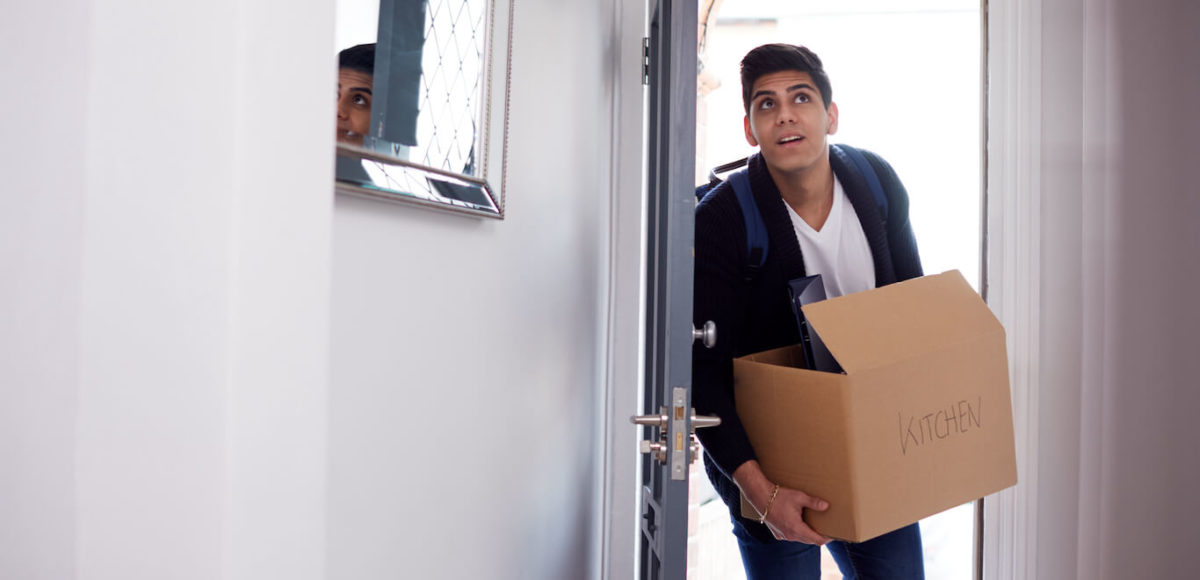Dorm life: convenient for getting to class, low-maintenance, and ideal for socializing and making friends.
Off-campus living has some serious perks, too. You enjoy more privacy, a room to yourself, and a new sense of independence. No more community bathrooms you have to share with thirty other people, either. What a glorious thought!
Your school may not share much information about off-campus housing, but we’re here to get you started with need-to-know info. Don’t get caught by surprise. Read up on the top five things you need to know before renting an off-campus apartment.
1. Not all leases are the same.
When you live in a dorm, you pay a flat fee in rent, usually for a semester or for the whole year. That fee includes rent for your room, electricity, internet, cable, water, and other amenities shared by other residents in the building.
With an off-campus apartment, that’s not always the case. Most landlords don’t include utilities in your rent (though some might, so be sure to ask). You’ll be responsible for setting up and paying for utilities on top of your rent payment, so consider those extra costs when looking at the budget for your first apartment.
Don’t forget to ask about other fees, too. There could be an additional cost to use community amenities like a pool, or charges for onsite parking.
2. A great landlord makes a huge difference.
If you’ve ever talked to your dorm’s resident assistant or director about an issue or concern, you know how much peace of mind can come from having someone around who’s willing to help.
When you move into an apartment, the management staff (or your landlord, in some cases) is responsible for helping you with things like repairs, neighbor disputes, or security concerns.
When you’re looking for off-campus apartments, be sure to meet with the staff or landlord in person and ask about their policies for things like emergency maintenance or noise complaints. Be wary if they can’t answer your questions or don’t seem to care. It could be a red flag.
3. Photos don’t always tell the whole story.
You probably had the opportunity to tour your dorm building before you moved in, right? It’s important to tour potential off-campus apartments, too. Pictures can make an apartment look amazing, but they likely won’t reveal things like that awful highway noise right outside your window or that huge dumpster out back (hold your nose!). Save yourself from disappointment and request a tour of the exact apartment you’re considering—before you sign a lease.
4. Your lease term may last longer than the school year.
Unlike a dorm lease term that starts and ends when the school year does, an off-campus apartment will most likely have a 12-month lease term.
That means you’ll pay rent while class is in session AND over the summer months, regardless of whether you stay in town or not. Unless you’re sticking around for summer classes or a year-round job, that’s a big chunk of money to pay for an apartment you’re not using.
Before you sign a lease, be sure to ask if your apartment allows subleasing for the summer. Subleasing means you could have your rent covered by a different resident while you’re out of town for a few months.
5. Off-campus apartments are not always furnished.
When you move into a dorm, your room is most likely pre-furnished with the essentials: a bed, a desk, a dresser, maybe some drawers. But when you move into an off-campus apartment, that’s not always the case!
Furnished apartments are an excellent choice for off-campus housing, but what if you can’t find one? No worries! You can turn any apartment into a furnished apartment with furniture and décor rental from CORT.
When you find the perfect place on ApartmentSearch, we’ll pay you. On your rental application, list ApartmentSearch.com as the way you found your off-campus apartment and you’ll get a $100 Visa Gift Card for whatever you need, plus $100 CORT Bucks to buy or rent furniture. An awesome apartment, plus some extra money to decorate it just the way you like—what could be better?




